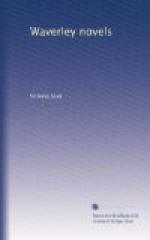I am aware I may be here reminded of the necessity of rendering instruction agreeable to youth, and of Tasso’s infusion of honey into the medicine prepared for a child; but an age in which children are taught the driest doctrines by the insinuating method of instructive games, has little reason to dread the consequences of study being rendered too serious or severe. The history of England is now reduced to a game at cards, the problems of mathematics to puzzles and riddles, and the doctrines of arithmetic may, we are assured, be sufficiently acquired by spending a few hours a week at a new and complicated edition of the Royal Game of the Goose. There wants but one step further, and the Creed and Ten Commandments may be taught in the same manner, without the necessity of the grave face, deliberate tone of recital, and devout attention, hitherto exacted from the well-governed childhood of this realm. It may, in the meantime, be subject of serious consideration, whether those who are accustomed only to acquire instruction through the medium of amusement may not be brought to reject that which approaches under the aspect of study; whether those who learn history by the cards may not be led to prefer the means to the end; and whether, were we to teach religion in the way of sport, our pupils may not thereby be gradually induced to make sport of their religion. To our young hero, who was permitted to seek his instruction only according to the bent of his own mind, and who, of consequence, only sought it so long as it afforded him amusement, the indulgence of his tutors was attended with evil consequences, which long continued to influence his character, happiness, and utility.




